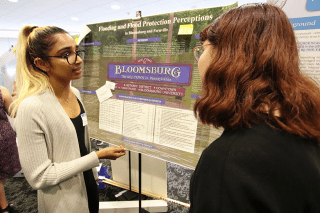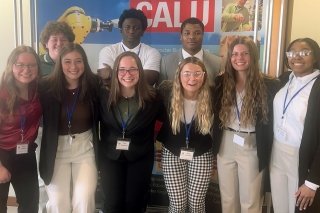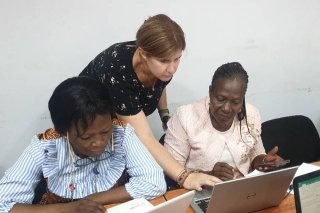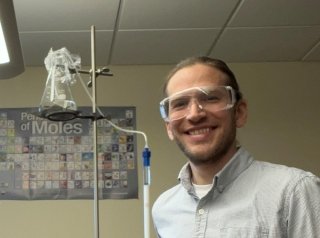Dual major researches social implications of flooding
Posted:

Sweetie Patel’s studies of environmental biology and anthropology have been the inspiration for her summer research through Bloomsburg University’s URSCA (Undergraduate Research, Scholarly, Creative Activity) program.
“I came to Bloomsburg University originally as an environmental biology student because of a deep interest in biology and my newfound environmentalism,” Patel says. “I quickly declared anthropology as my second major, because I believed I was seeing only a small portion of a much bigger picture with a single major.”
She adds, “I realized that cultural ecology is essential to the development of a more systematic understanding in environmental biology and that a bio-cultural perspective would provide me with the scope and complexity to better understand the social implications of environmental problems, such as flooding.”
Patel is one of nearly 30 students who conducted research this summer through URSCA.
“I’m uncovering Bloomsburg and Fernville residents’ experiences with flooding and how they have changed their behaviors and attitudes to see how it has affected their lifestyles,” says Patel. “I’m also looking at officials’ perceptions of the flooding problem, their own experiences as town residents, and how they are helping address the issue.”
Patel feels studying environmental biology and anthropology has given her a broader sense of how human activity affects surrounding environments and how humans adapt to environmental changes.
“I find it crucial living in a global community, to learn as much as possible about this relationship in as much depth as possible,” says Patel. “As an aspiring scientist and researcher in the natural and social sciences, I hope to bring the two scopes of environmentalism and humanitarianism together to draw conclusions and spread more knowledge that can potentially be applied to international issues and problems.”
Patel feels her local research can be looked at by others and applied to many other communities globally who face similar problems.
“On the surface, my research is merely local,” Patel says. “I hope to be a liaison for those who wish to be heard regarding an issue that seems to be tackled by officials but may not actually show results or unfortunately might be worsening the problem. The issues we face in our local communities are likely faced by others in places far away, and the lifestyles of humans affect others on the local, regional, and global scales.”
“This experience will give me the tools to apply my knowledge on a global scale as humans are now all part of the global community,” adds Patel. “The fact of the matter is that every aspect of life is interconnected and intertwined. I ultimately hope for my research to create a ripple effect. I’ll present the gathered information for the public to help find solutions and develop policies aimed at improving the human condition.”



